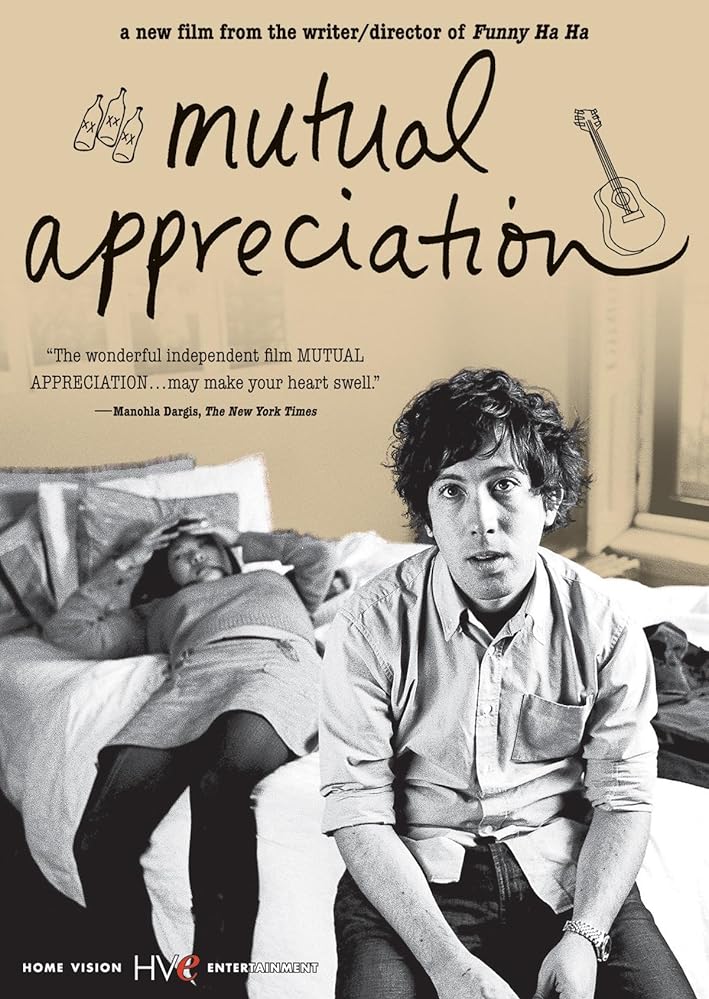
MUTUAL APPRECIATION
(director/writer: Andrew Bujalski; cinematographer: Matthias Grunsky; editor: Andrew Bujalski; music: songs by Justin Rice & Kevin Micka, Bishop Allen, Omzo, Matty & Mossy, the Common Cold and Brandon Patton; cast: Justin Rice (Alan), Rachel Clift (Ellie), Andrew Bujalski (Lawrence), Seung-Min Lee (Sara), Kevin Micka (Dennis), Bill Morrison (Walter), Pamela Corkey (Patricia), Mary Varn (Rebecca), Kate Dollenmayer (Hildy); Runtime: 110; MPAA Rating: NR; producers: Ethan Vogt/Morgan Faust /Dia Sokol; Goodbye Cruel Releasing; 2005)
“Bujalski’s tantalizing cultish films are the best work I’ve seen coming out of recent American indie films.”
Reviewed by Dennis Schwartz
Harvard grad, the 29-year-old at the time of filming indie writer-director, Andrew Bujalski’s second feature, after the deliciously pitch-perfect ironic romantic comedy slice of life film Funny Ha Ha (2002), follows that acclaimed film with another delightful comic romp about the twentysomething crowd expressing their angst about taking their place in the world and being unclear about their sexual relationships and about themselves as grownups. Bujalski has a keen ear for picking up the lingo of this bright post-college crowd and masterfully tells their story through their nervous tics, wandering eyes and awkward conversations. It’s an unassuming work of great accomplishment, one that’s always witty, poignant and right on the money in nailing his subjects. Shot in Brooklyn in a grainy black-and-white, with a shaky camera and in 16-millimeter blown up to 35-millimeter; it has the gritty feel of authenticity much like a John Cassavetes or Richard Linklater film or the French New Wave Jean Eustache’s very chatty “The Whore and the Mother” (1973). Bujalski’s tantalizing cultish films are the best work I’ve seen coming out of recent American indie films, they are not afraid to offer a fresh outlook on familiar things, hit one’s raw nerve spots and shoot for the moon by playing its cards out in a low-key but intelligent way.
Twentysomething Alan (Justin Rice, is co-founder of the indie-rock band Bishop Allen), an aspiring rock musician, comes to New York to see if he can make it and hooks up with his best friend from school Lawrence (Andrew Bujalski, the director), a bespectacled college teaching assistant and grad student who is seeing a journalist for an underground newspaper named Ellie (Rachel Clift). While waiting for Lawrence to return to his flat, a grinning and smirking Alan is laying across the bedroom bed having an awkward chat with Ellie, who complains of always being tired. Alan deduces it’s because she’s a vegetarian and has an iron deficiency. Though sex is in the air, it’s repressed and when Lawrence joins them on the bed the playful chatter continues but is just so much diverting chatter among the three uncertain self-conscious characters that it fails to register as meaning much.
Alan is interviewed by a radio D. J. named Sara (Seung-Min Lee) and afterwards ends up in her apartment, as she hooks him up with her drummer brother Dennis (Kevin Micka) for his gig at the Brooklyn hipster club Northsix. His band Bumblebees have all split and he’s the only member left, and feels he can get by with just a drummer. Alan is not attracted to the forward Sara and will reject her sexual advances by nervously saying he has “a congenital tremor,” the slacker will also not be overly receptive to his father’s advice to take any job to earn money while he strives to be a musician and to his father’s client friend Walter (Bill Morrison) and his attempt to fix him up with a small record contract, and in a ha-ha scene is caught with his pants down when he stumbles into a girlie trio’s bitchy wig party and is coaxed into being dressed with a wig, eye shadow and a dress. The film’s most tense scene has Ellie expressing an appreciation for Alan, which he acknowledges is mutual. Though nothing physical happens, Ellie feels compelled to tell Lawrence her these hard to express feelings. When Alan and Lawrence get together again they have a strained conversation on this matter, afraid to express what’s really on their mind as they calmly talk about what Ellie said in an all too civilized way. The film ends like all Bujalski’s scenes end, he simply cuts away from the action and leaves us in the dark to make of it whatever we can. Since the characters are best understood when they are unsure of their own footing and their riffs always end up unclear, the brilliance of this paradoxical comic dramatization is that it doesn’t have to go anywhere to arrive at where it’s going. The often stale contemporary movie scene for the youth market needs films like this to pump new blood into its system, as after seeing so many recent Hollywood and indie formulaic films about these very people this seems to be the best one to get at the human condition and what the hell is going down with these disenfranchised young bloods.
REVIEWED ON 10/9/2006 GRADE: A